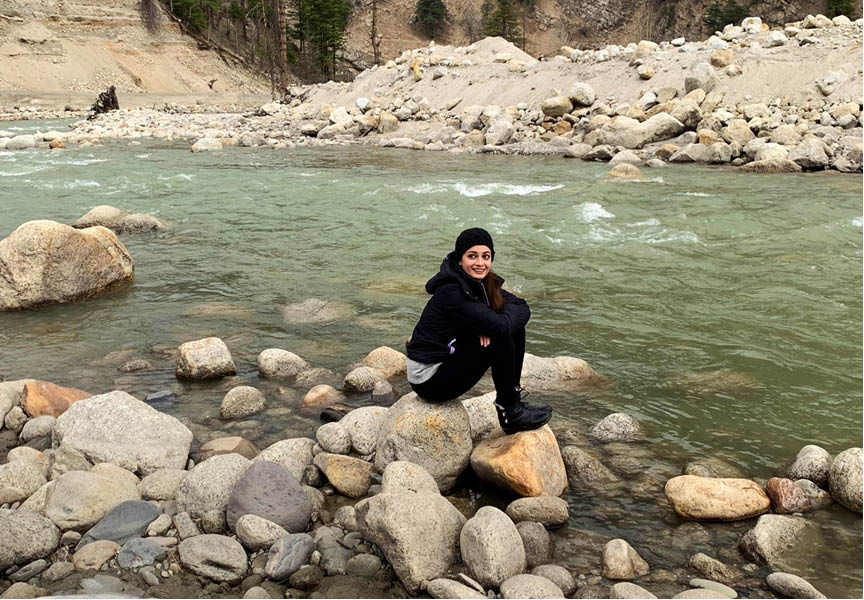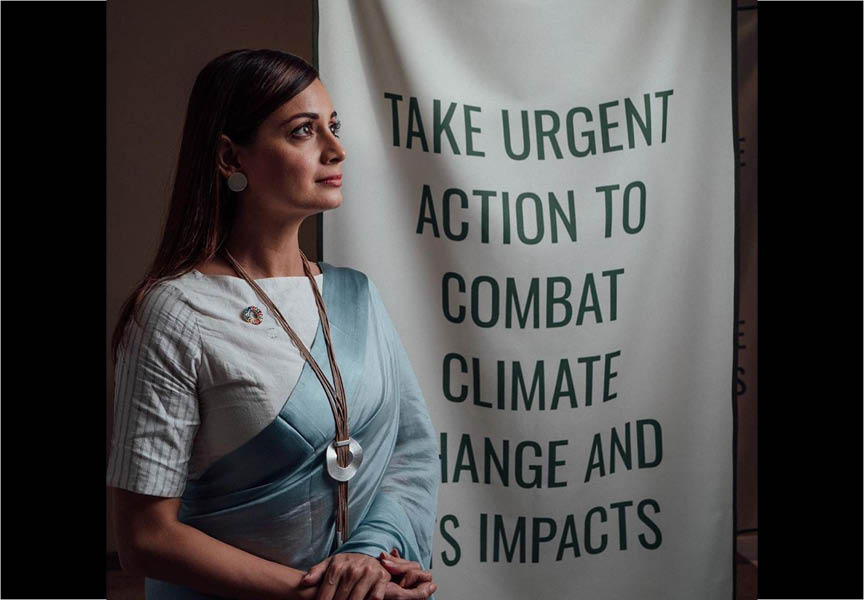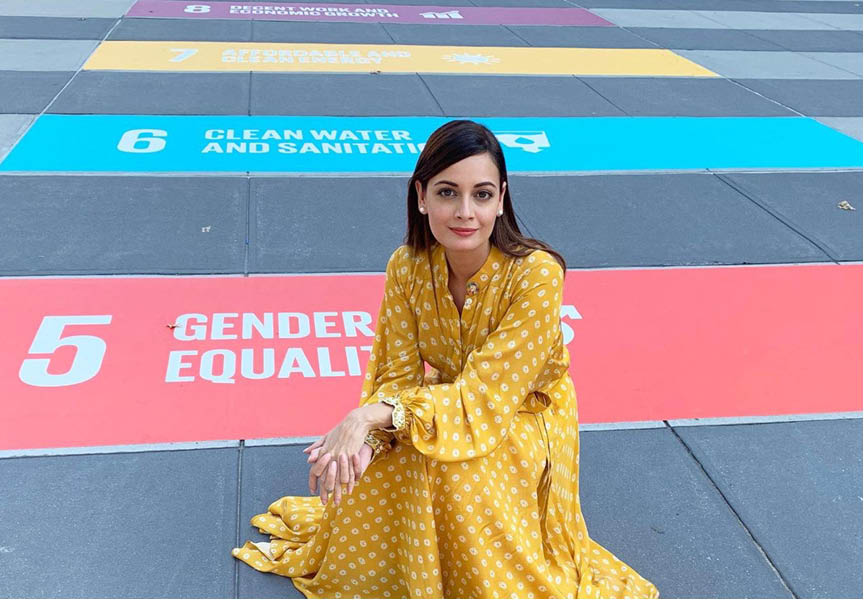There was a moment during our conversation with Dia Mirza when she suddenly spotted a coppersmith barbet sitting outside her window. Not many know that this tiny bird was elected as the official bird of Mumbai in 2011, but Mirza did. “It’s a tiny bird. It’s green, it’s got red bits on the forehead, and it makes that ‘tak-tak’ sound. It’s so sweet, and it’s right here,” she exclaimed excitedly, proving once again that her passion for nature and sustainability is not only genuine, but all-encompassing.
You may know her predominantly as an actor and producer, but over the last few years, Mirza has also adopted the roles of UN Environment Goodwill Ambassador and Advocate for the UN’s Sustainable Development Goals, driven mostly by the passion, she says, which was instilled in her since childhood.
Learning, forgetting and re-learning about the environment
Mirza explains that sustainability and eco-consciousness was inculcated in her life when she was a student of Vidyaranya School in Hyderabad—the school’s name literally means ‘forest of education’, she explains, and was founded on the principle of letting children interact deeply with nature. She also believes that the fact that the first alarm bells for climate change started to ring, coincidentally, in the year she was born (1981), also played a huge role in her life. She’s referring here to the 1981 study, published in the journal Science, by Dr James Hansen at NASA’s Institute for Space Studies, in which an estimate of future climate change and anthropogenic global warming due to rising CO2 emissions was first made.
“Those were simpler times,” Mirza points out. “If you compare our childhoods with the kind of childhoods children have today, which is very high on consumption and waste, we were really simple kids.“ But despite the early mobilisation and lessons about sustainability, Mirza’s life as an adult in her 20s seemed to be taking her in a very different direction. “Like with many of us, what happens and can tend to happen, is as you grow older and are consumed with ambition—and you’re also a part of a capitalist, material world—you tend to forget. And I did too.”
Her re-acquaintance with sustainability happened when she started campaigning for cancer awareness, and engaging with doctors. “That’s when I recognised how deeply connected human health was with environmental health, and how deeply degraded our environment was getting.” It was around the same time that she met Bittu Sahgal, the environmental activist and founder of Sanctuary Nature Foundation, and Vivek Menon, the wildlife conservationist and environmental commentator. Mirza reveals that she “doggedly pursued” them to be able to learn more about the environment, and to work with them.

There was another experience which had a huge impact on her. While working on Ganga – The Soul of India (released in 2016), she saw “ravines of plastic in the most pristine environments. Then it really hit me how badly behaved we were, and how irresponsible we had become, and how we were polluting everything.” The experience really shook her, and it quickly became her “obsession to draw people’s attention to plastic pollution. In fact, the first conversation I had with the United Nations Environment Programme when I was first appointed as their ambassador, was ‘What are we doing about all this plastic? It’s everywhere’. And they said, ‘Good question because we’re going to start asking the world this question’.”
Sustainable Development Goals and where India stands
Mirza aptly calls the UN’s 17 Sustainable Development Goals (SDGs) “the North Star, the guiding light for all of human behaviour.” The SDGs were created in 2015, and the 193 countries who adopted them have the deadline of 2030 to achieve the goals. “I have always believed that the most critical goal, the goal that impacts every other goal, is Climate Action,” Mirza says. “We can’t hope to have food for all, or education for all, or peace or any kind of stability, if we don’t bring back the balance.”
She’s heartened by the fact that the UN Secretary-General highlighted the need to fund Climate Action around the globe in the recently concluded G7 Summit highlighted. “While the First World may be able to, very quickly, build back better and switch to greener innovations—it’s quite pathetic that they haven’t already—it is our countries in the developing world that need financial assistance to make those changes, to become more environmentally friendly.”

Mirza is very proud of the commitment many sectors in India are making, and highlights that there are many areas that need urgent attention. “The truth is that there is infrastructure that we want to build and there are so many parts of our development plans that are not in sync with building green,” she says. “But thankfully due to a robust, young community that has stepped up to highlight all kinds of natural devastations and degradations, and to question policy, we’re beginning to see a change in policy, and decisions past being turned over. That again, to me, is very encouraging. But until the big polluters change, nothing else will.”
Plastic, pandemic and sustainable living in India
To drive this change, Mirza’s attention over the last few years has been on the UN’s Beat Plastic Pollution campaign. “The Beat Plastic Pollution campaign draws our attention to the fact that we are intense users of plastic, and we’re irresponsible users of plastic. But more than anything else, we’re also irresponsible generators of plastic,” she says, explaining that “if you think about it, practically everything we consume in our daily life is now being packaged in plastic. None of that plastic is accounted for. The producers aren’t held responsible for that packaging.” This is the reason why, she says, environmental activists are now fighting for extended producer responsibility. On the other hand, as consumers, she insists that we should all say no to single use plastic and become aware of how we let plastics into our lives. “I think more people now realise that plastic has entered our food chain, it’s polluting our oceans, it’s now even found in the amniotic fluid of a pregnant woman,” she says.
When it comes to individual action, Mirza has personally proved that you can make a change if you choose to. Her wedding with Vaibhav Rekhi in February 2021 was completely plastic-free and had zero food waste. The wedding was also officiated by a woman priestess, Sheila Atta. Mirza insists that you can completely adopt such small changes in your life to uphold the SDGs, and explains that she will raise her own child naturally and sustainably, in harmony with nature.

COVID-19 triggered an anthropause
She also believes that the COVID-19 pandemic has given a wake-up call to people . “What the global pandemic did was to cause something called an anthropause—we basically got the great pause, which was just an opportunity for us to see that when we are shut indoors, and when our consumerism is reduced and we stop human activity, how nature just comes back.” She adds that while the pandemic has caused a terrible setback, it has also “created a very important pause for us to recognise all that we need to do, and to acknowledge that, okay, we can’t keep going the way we have so far. We have to fix this problem, and we can’t fix it without fixing the climate.”
This is where, she insists, the urgent need to get educated about sustainability gets crucial. “Sustainability really is about understanding that our patterns of consumption need to change. I think for too long, human beings have lived too far away from nature and forgotten that we’re a part of nature, not apart from nature. Everything we have done to the natural world is directly linked with our suffering today, our loss today, our devastation today. If we want to live in a world that doesn’t have rapidly changing climate, that doesn’t have pandemics that cause so much pain and misery, we will HAVE to learn about sustainability.”
So, what does she believe is the biggest lesson the pandemic has taught us regarding sustainability? “We’re working from home, aren’t we? That’s reduced our consumption, significantly,” she says. “We’ve all discovered that there is actually so very little that we need. All that stuff that we were hoarding and all those things we wanted. What do we really want? To be able to step out. And if you really want to continue to step out in a world where the temperatures are not crossing 50 degrees centigrade, or where you don’t have regular cyclones, droughts, and pandemics, well, then you just need to step back a little.”